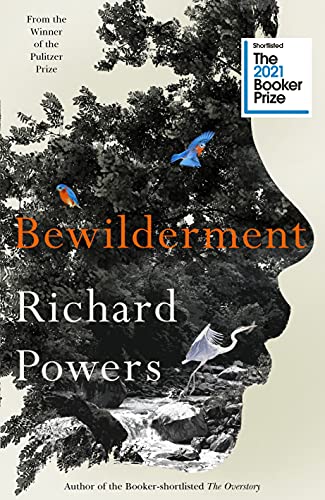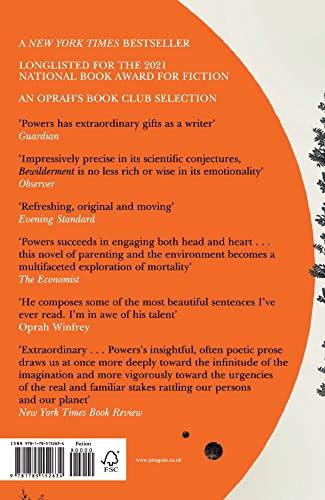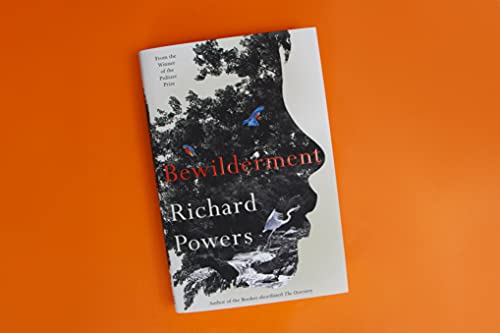




William Heinemann Bewilderment: Shortlisted for the Booker Prize 2021
M**R
An accessible read with deep ideas
This is an enjoyable book. It provided me with a thoughtful story based around a father and his son, what we have done to the planet and especially what we have done to the other life on the planet. I also found the book’s structure and style made it easy to read. My preconceptions of the book were changed on reading it. Promotional material had mentioned the violence of the young boy and of trips to other planets. The mention of violence had initially put me off, but I found that it was only an isolated incident. The trips to other planets suggested a heavy science fiction or fantasy element, but these were mind-trips, created by the boy’s father as bed-time stories (1).THE STORY concerns a widower and his son, both consumed with grief for their recently dead wife and mother. It begins with father and son on a camping holiday in the hills, celebrating his son’s ninth birthday. The boy is full of hurt and anger and his father has problems coping with his son’s behaviour. She had worked in animal rights and her ideas had deeply affected both of them. The father was under pressure from his boy’s school and the doctors to medicate his son, but he resisted. This pressure greatly increased after his son’s act of extreme violence on another pupil. Searching for a solution, his father turns to a psychologist in the local university who uses an experimental method called DecNef (2). They have recordings of earlier DecNef sessions undertaken by the boy’s mother and he is trained on these. The effects of this treatment on the boy form the main part of the book.THE BOOK does not have chapters. These are replaced by short untitled scenes of between a half-page to several pages in length. Each scene is flagged by starting on a new page, with part of the first sentence in uppercase. The scenes are punctuated by the father’s stories to his son of alien planets and their different eco-systems. There are also two background threads. The first has scenes about climate change events. The second has scenes about the political climate caused by the US President. This structure seems to drag you along in the story. The sentences are also short and accessible. It is the ideas that are complex.FOR SOME READERS this book is too didactic, too scientific and too preachy. They will like the characterisation of a bereaved father and son, the long shadow of the deceased mother, the lost wife and nurturer. They will like how the father tries his best to help and protect his disturbed child. They will not like the technological psychology, the astrobiology and the environmental gloom. For others, all of these things will come together and give a thoughtful and positive read.____________________________________________________________(1) The father works as an astrobiologist. He spends his time creating simulations of alien planets and their biospheres. He uses these simulations, and his collection of two thousand science fiction paperbacks, as a basis for the stories he tells his son. For example, the planet Chromat “had nine moons and two suns, one small and red, the other large and blue. That made for three kinds of day of different lengths, four kinds of sunset and sunrise, scores of different eclipses, and countless flavors of dusk and night. Dusk in the atmosphere turned the two kinds of sunlight into swirling watercolors.” (page 161)(2) DecNef is short for Decoded Neuralfeedback. It involves the use of functional MRI (fMRI), neurofeedback and Artificial Intelligence (AI) software. The science fiction book Flowers for Algernon is mentioned on page 41 and this may have been an inspiration for this book. Flowers for Algernon
H**D
A Testament to our Troubled Life and Planet
I am a fan of Richard Powers and have read all 13 of his novels. I feel justified in hailing him, sometime ago, as the greatest living novelist writing in English. Whilst I was pleased to see the long overdue success of the Overstory, I have to admit that I did not really enjoy it. For me, although in a similar vein to the Overstory, Bewilderment is a more engaging story. Having said that Powers great masterpieces are behind him. I am thinking of novels such as: The Gold Bug Variations, Operation Wandering Soul, The Time of Our Singing and The Echo Maker.Bewilderment is a story about a father, Theo Byrne, his son, Robin, and their grief for a wife and mother, Alyssa, who died in a car accident. The story is narrated by Theo from the perspectives of himself and son. Theo is an astrobiologist who searches for life on other planets and Robin is a troubled nine-year old. Both father and son while grieving for the loss of Alyssa are also profoundly concerned about what is happening to planet earth. Theo raises Robin as a single parent and has concerns for his troubled son who has some form of mental health disability. Theo avoids allowing his son to be treated with psychoactive drugs opting instead for a futuristic treatment know as Decoded Neurofeedback where certain aspects of the thoughts of someone else is mapped into his son’s thoughts – in this case his mother’s. The aim of the treatment is to achieve: “a world where one person’s anger is soothed by another’s calm, where your private fears are assuaged by a stranger’s courage, and where pain can be trained away, as easily as taking piano lessons.”Father and son take time out and venture on a camping trip into the woods called the Smokies. During this trip we begin to learn about the family’s background and the concerns of the two protagonists. To bring to life the concerns of the protagonists, Powers combines a realistic story about how we humans are treating the planet along with science fiction about imaginary planets and the development of new technologies that might enhance our lives.This is not the first novel in which Powers has used digression as a means of presenting vignettes of other stories. In his brilliant novel, Operation Wandering Souls, which tells the story of traumatised children in a hospital ward, in order to place the children’s experience in historical context, Powers interrupts the main narrative with classic stories of mistreated children. In Bewilderment in could be said that the digression to stories about life on other planets is a call for us to imagine other life forms and ways of living.Through Robin’s mental health disability, Powers explores an area he has broached before in his novel The Echo Maker – namely the study of the brain and the nerve system. The novel peeks into the future by speculating about alternative therapies other than psychoactive treatment for mental health disability. So Robin undergoes treatment by means of using an fMRI scanner to address his mental health issue. He practices mindfulness a kind of meditation which along with Decoded Neurofeedback is said to “steer him toward the desired emotional state”.In Bewilderment, Powers continues with an approach that combines the arts and science. Robin’s curiosity leads Theo to explain many scientific issues – for example the relationship between electrons and atoms. Also, in a lecture on the origins of life he reminds us that: “Here on earth it was archaea and bacteria and nothing but archaea and bacteria for two billion years. Then came something as mysterious as the origin of life itself”.Ultimately the narrative drifts towards environmental politics. We have an unnamed president who corruptly orders the arrest of a journalist on the pretext that she published leaked information. This is an allusion to Trump. Also, a young fourteen-year-old protester is given credence for organising a cyclist protest – an allusion to Greta Thunberg. Robin finds her inspiring. This jarred with the overall narrative and lacked conviction.The politics of the novel is one of pessimism. There is scepticism from politicians about founding a project that would search for extra-terrestrial life. But the scepticism is not just about financial cost it is also driven by a view that humans are the only conscious sentient beings in the universe worth bothering about. The novel sums up this position by stating that: “if we academic elites found life arose all over, it wouldn’t say much for humanity’s Special Relationship with God”. It is also a political place in which the separation of key state institutions has become at best blurred and worst lost. So, “Congress itself now took orders from the White House, and the appointed judges had fallen in line. A steady destruction of norms favoured by less than half the country had united the branches of government under the president’s vision.The story is rendered partly in a style that is opaque. Powers has a way of making the familiar unfamiliar as in poetry. This gives pause for thought about what is being conveyed. Nonetheless, Powers overall style is absorbing. In one section the rhetorical style gave the impression of a great orator impassioned about the issues being conveyed.This is a novel, as its title suggests, that ask the reader to think of other ways of being and living. What detracts from this otherwise timely and worthwhile novel is that the protagonists are overly driven by a narrow cause which in turn gives the novel a feel of didacticism. In the context in which we live one asks the question does this matter? The answer lies in this line from the novel: “But ten thousand children with Robin’s new eyes might teach us how to live on Earth”.
V**N
A powerful work of literary science fiction with compassion
“You know. The mouse, Dad. The mouse.” - from ‘Bewilderment’ by Richard Powers.Powers’ Pulitzer Prize winning ‘The Overstory’ was one of my favourite reads of 2018 and so I was very keen to read ‘Bewilderment’. While ‘The Overstory’ was an epic, the focus of ‘Bewilderment’ is primarily upon the relationship between a widowed father and his troubled son; though themes linked to ecology and the Anthropocene are also found within its narrative. It is set in a slightly alternative USA, as indicated by chilling events playing out in the background.Theo Byrne is a promising young astrobiologist engaged in the search for conditions suitable for life on other planets light years away. His nine-year-old son, Robin is an imaginative child, who feels deeply about nature and animals. He is also artistically gifted, quite capable of spending hours painting elaborate pictures of endangered species.Yet Robin is also behaving erratically at school and is being threatened with expulsion from the third grade following a violent incident with a classmate. Robin is grieving the loss of his mother, Alyssa, killed in a car accident two years previously. Theo, too, is struggling to come to terms with her sudden death.Theo encourages Robin’s art and his interest in the global campaign to address climate change. Theo also utilises his experience of mapping theoretical worlds to create scenarios of new planets for Robin to explore. This helps some though Theo is being pressured to put Robin on psychoactive drugs or risk social services stepping in.Then Robin is referred to a radical experimental program that uses mind mapping for behaviour modification. Will this be successful and what are its ramifications?‘Bewilderment’ is a work of literary science fiction that aptly demonstrates to those that continue to disparage the genre that it is capable of exploring serious, wide-ranging themes. Theo’s lifelong interest in other worlds, both in actuality and in his reading of science fiction, is highlighted, including mentions of ‘Flowers for Algernon’, a novel that has a poignant resonance with aspects of the story.Overall, I found this an intelligent, thought provoking novel that explores the relationship between a father and son and encompasses themes of loss and bereavement as well as the possibilities inherent in human consciousness. It also made me weep. That’s a rare combination.As I know that this is a novel that I shall want to return to and think upon, I had preordered its hardback edition.I was pleased to see ‘Bewilderment’ shortlisted for the 2021 Booker Prize for Fiction.Very highly recommended.
M**N
A very poor book indeed
I struggle to see how this book can be nominated for such a prize. I assume the gravity of the subjects it covers was appealing. The book lacks clarity, and I found it poorly structured and badly written. It felt as if the writer had a good idea, and in truth the subject is good, but failed to consider how it should work. I’m not a fan of first person colloquial dialogue unless it really works, and this doesn’t. Very disappointed, and I struggle again to see how eminent reviewers such as those used in its advertising, could have read the book to give such reviews.
B**X
Mawkish
This is a novel written from the point of view of a widowed “astrobiologist” with a 9 year old son with some form of autism. The son gets inspiration from a Greta Thunberg-like character whom he sees on television and then becomes a sort of eco-warrior, despite eating avocado(!) sandwiches.Every sentence induces a powerful urge to cringe. It is poorly written, in irritating colloquial American-English and the attempts at humour, as well as the descriptions of the relationship with his now dead wife are embarrassing. Probably the worst aspect of this book is that none of the characters have any charm, even the autistic son. Rather than being quirky, he is just intensely annoying in a sacchariny way. The novel has an all-pervading sanctimonious tone, which makes it impossible to even vaguely like the characters. This is self-indulgent, pretentious, cloying, sentimental drivel. The novel is so bad that I wondered at one stage if it was a satire. It isn’t.It was, bizarrely, shortlisted for the Booker prize, which used to be a fairly reliable source of well written books. How on earth did this get shortlisted?Sadly, I think we know the answer to that…..Avoid.
Trustpilot
1 day ago
2 months ago